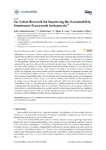An Action Research for Improving the Sustainability Assessment Framework Instruments

Ver/
Use este enlace para citar
http://hdl.handle.net/2183/25280
A non ser que se indique outra cousa, a licenza do ítem descríbese como Atribución 4.0 Internacional
Coleccións
- GI-LBD - Artigos [51]
Metadatos
Mostrar o rexistro completo do ítemTítulo
An Action Research for Improving the Sustainability Assessment Framework InstrumentsData
2020-02-24Cita bibliográfica
Condori-Fernandez, N.; Lago, P.; Luaces, M.R.; Places, Á.S. An Action Research for Improving the Sustainability Assessment Framework Instruments. Sustainability 2020, 12, 1682. https://doi.org/10.3390/su12041682
Resumo
[Abstract] In the last years, software engineering researchers have defined sustainability as a quality requirement of software, but not enough effort has been devoted to develop new methods/techniques to support the analysis and assessment of software sustainability. In this study, we present the Sustainability Assessment Framework (SAF) that consists of two instruments: the software sustainability–quality model, and the architectural decision map. Then, we use participatory and technical action research in close collaboration with the software industry to validate the SAF regarding its applicability in specific cases. The unit of analysis of our study is a family of software products (Geographic Information System- and Mobile-based Workforce Management Systems) that aim to address sustainability goals (e.g., efficient collection of dead animals to mitigate social and environmental sustainability risks). The results show that the sustainability–quality model integrated with the architectural decision maps can be used to identify sustainability–quality requirements as design concerns because most of its quality attributes (QAs) have been either addressed in the software project or acknowledged as relevant (i.e., creating awareness on the relevance of the multidimensional sustainability nature of certain QAs). Moreover, the action–research method has been helpful to enrich the sustainability–quality model, by identifying missing QAs (e.g., regulation compliance, data privacy). Finally, the architectural decision maps have been found as useful to guide software architects/designers in their decision-making process.
Palabras chave
Sustainability assessment
Sustainability–quality model
Decision map
Action research
Software-intensive systems
Sustainability–quality model
Decision map
Action research
Software-intensive systems
Versión do editor
Dereitos
Atribución 4.0 Internacional
ISSN
2071-1050






